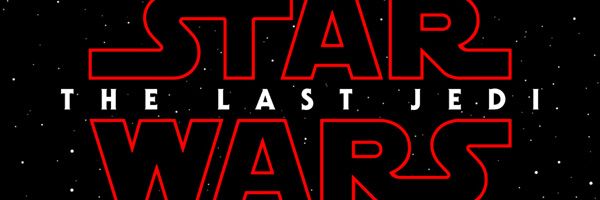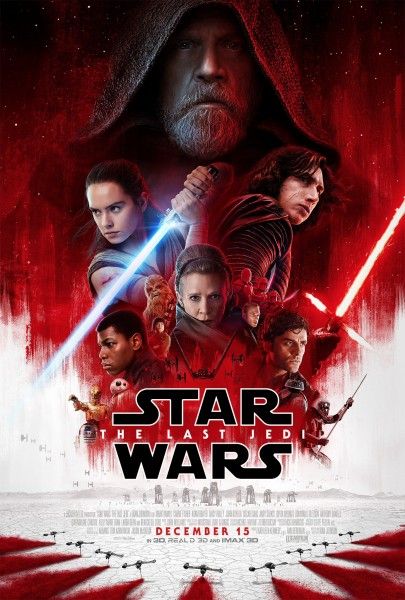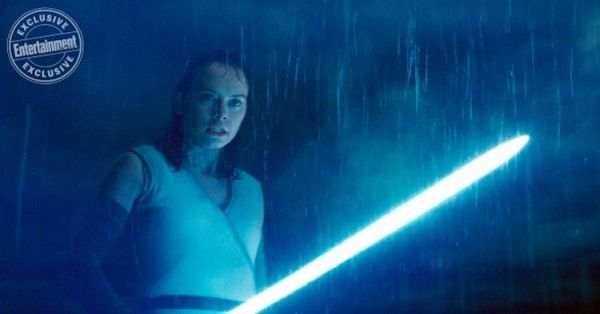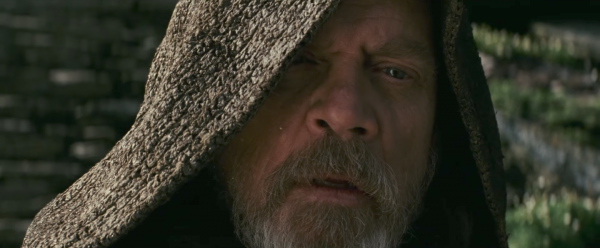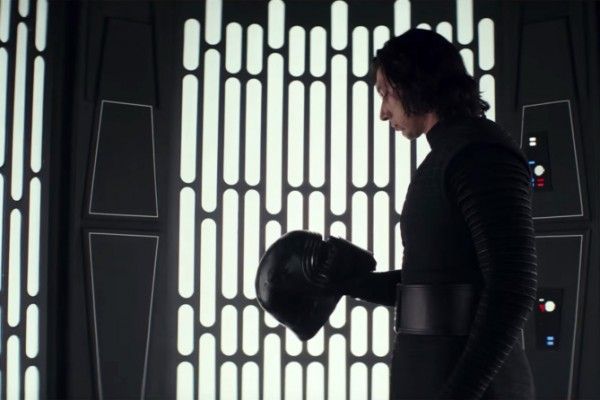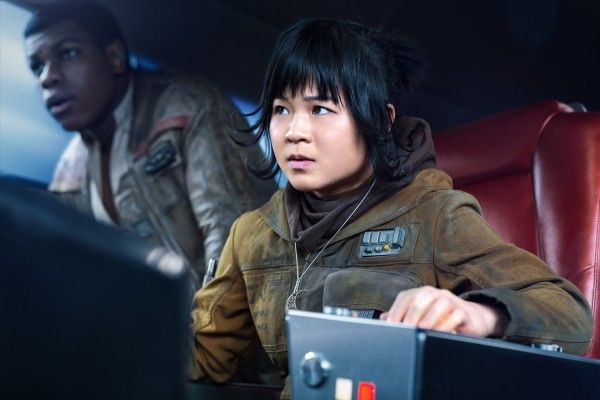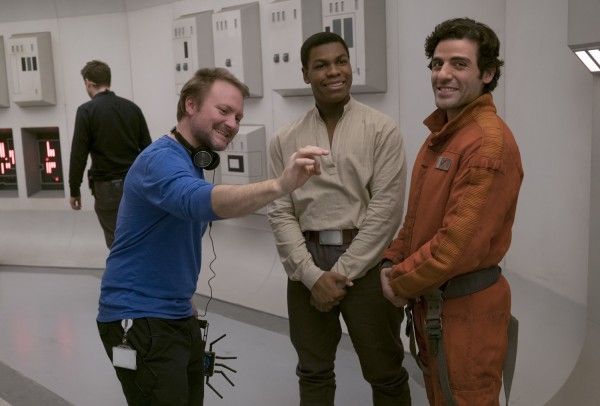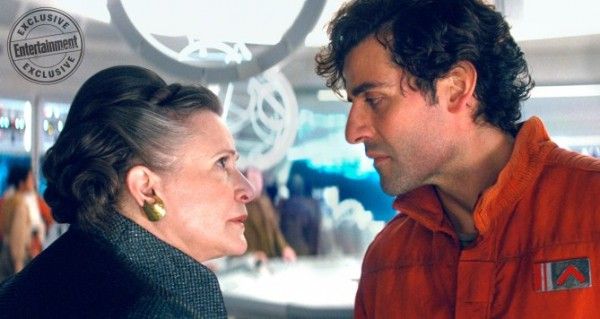Because of all the secrecy surrounding each new Star Wars film, we typically find ourselves having to speak with the cast before we actually get to see just where things are headed next. While that means we can’t delve into specific plot points, we can still share fun stories from the experience the cast and filmmaker had, in making the next installment in the beloved franchise, and share what it means to them to be a part of this world
At the Los Angeles junket for Star Wars: The Last Jedi, cast members Mark Hamill, Daisy Ridley, John Boyega, Oscar Isaac, Adam Driver, Gwendoline Christie, Laura Dern, Domhnall Gleeson, Kelly Marie Tran and Andy Serkis, along with director Rian Johnson, spoke at a press conference about their experience making this film and how it will surprise audiences, and we've included the highlights.
The ways in which The Last Jedi differentiates itself from The Force Awakens:
RIAN JOHNSON: It’s the second movie in the trilogy, and I think we’ve been trained to expect it’ll be a little darker. Obviously, it looks a little darker. For me, I loved the tone of the original films, which J.J. [Abrams] also captured in The Force Awakens. To me, first and foremost, we were trying to make it feel like a Star Wars movie. That means you have the intensity and you’ve got the opera, but it also means that it makes you come out of the theater wanting to run in your backyard, grab your spaceship toys and make them fly around. That’s a key ingredient to it. So, we go to some intense places in the movie, but I hope it’s also fun and funny.
MARK HAMILL: My answer will be in direct proportion to the amount of screen time that I have.
JOHN BOYEGA: I just think the story is moving forward. I feel like J.J. had a blueprint and foundation for The Force Awakens that was good, and now it’s about moving forward with the story and challenging the characters. All the characters are under intense pressure, so it’s a time that everyone has their own specific reckoning, and it’s all different. It’s a lot going on. I’ve only watched it once and I wanted to watch it again because of the amount of information and Easter eggs in there, as well.
OSCAR ISAAC: Because the first chapter sets the tone and introduces the world and the new characters, in the second chapter, you don’t have to spend so much time doing that. You can really just delve into the story, into what’s happening, and into the conflict of each of the characters. I think what Rian’s done so incredibly well is that he’s challenged, deeply, every single character, including the droids, with like the biggest challenges they’ve ever faced. That’s how you’re able to really get to learn about them, on all sides of the spectrum, from light to dark. He found a way to get to the central point of each character and challenge them, as best as he can. I think it’s really amazing what he’s done.
DAISY RIDLEY: The biggest thing, for me, when I read the script, was that, because people responded well to John [Boyega] and I, as a team, I was a bit nervous about not being a team so much, in this one. For me, personally, that was a challenge. I don’t know what it was like for anyone else, but to be in different combinations of people was a challenge. We’re in different situations and we’re with different people that we are learning about or meeting, for the first time, so it felt pretty different for me.
ANDY SERKIS: I was blown away when I saw the movie. I just was so caught up with it, not the least of which was because it was really intimate and very emotional, and I wasn’t expecting that, at all. I knew that it was going to go that way, but it was very, very powerful, and it touches you. What Rian’s done incredibly is make this dance, tonally, between these great, epic moments and hilarious antics, literally flipping on a dime, and then going right to the heart of these beautiful characters. You really care. For me, that was my takeaway. It’s just extraordinary viewing.
GWENDOLINE CHRISTIE: I was delighted by the film. I think the reason why Star Wars has resonated with us all so deeply is that it’s our foundation story of good against evil, where that balance is, and how we see elements of characters we’ve never seen before and things that can be unexpected. But there is something about this film and I think it’s because the world that we live in is a changing and evolving place. It retains the simplicity of those elements, but it really resonates with what it is to follow your own human, dark, narcissistic tendencies and where that will take you. I love that, and it’s done so beautifully aesthetically too.
DOMHNALL GLEESON: I didn’t go to the screening. I wanted to wait and see it with a huge crowd, the way I saw The Force Awakens, which was just with a load of people losing their minds. But then, I heard [the cast] lost their minds, so I was annoyed that I didn’t go.
What makes The Last Jedi different from all of the other Star Wars movies:
HAMILL: It’s longer.
JOHNSON: Not much longer.
RIDLEY: As an actor, I would much more easily draw comparison of similarity. I was real new to this all. [The Force Awakens] was my first film. I’ve done smaller films now and it genuinely feels the same. The sets tend to be smaller, and you shoot in Prague instead of London, but it’s that family thing. If you’re in a really safe environment, then you’re able to do more. Coming back, it was different ‘cause the story is different and the characters are being challenged, in different ways, but the crew was similar. I think it says a lot about Rian, and about what J.J. did the first time around. It’s just a really happy set, and everyone feels heard and respected. In an acting sense, I think the same feeling of love and of everyone trying to work together to make this thing that hopefully other people will love was captured. It felt more similar than different.
How much the newbies to the franchise geeked out about being in a Star Wars film:
KELLY MARIE TRAN: It definitely feels like you have to find a way to just do the work and block everything out, but then C-3PO comes up to you. You’re constantly figuring out how you can figure work in this environment because it is so awesome. It’s a balance.
LAURA DERN: What Rian does so beautifully is the intimacy of discovering each character’s conflict. It’s just extraordinary, given the enormity of the cast, that he gave us that in the experience of the workplace. It was shocking. Oscar and I always talked about just how stunned we were that we were in such a massive environment and did feel like we were making an indie movie. He was always encouraging us to try things and explore the character, and explore this duality of the light and the dark within the characters.
The evolving dynamic and bond between General Hux and Kylo Ren:
ADAM DRIVER: There’s definitely a competition, but it’s maybe yet to be discovered where that comes from. If anything, I think that’s more of a testament to what everyone has been saying about Rian. It doesn’t mean anything, if you don’t care about anything that’s going on, which seems very obvious. It’s a really hard thing to balance with this many moving parts, in the scale of something like this. I love playing those scenes, especially with Domhnall, ‘cause he’s a great actor and nothing is taken for granted. If anything, Rian slows the pace and there’s not a moment that’s taken for granted. It’s always broken up into little pieces and the story comes first, before an explosion.
GLEESON: I think it’s funny that there’s such a huge amount of drama going on, but then there’s also just a huge amount of bitchy infighting, as well. It’s really fun to see them hurt each other from the inside, as well as from the outside. The united front thing is difficult for them, sometimes. But, it’s just such a privilege to be in the film.
The ways in which the visual cues of The Empire Strike Back influenced The Last Jedi:
JOHNSON: My cinematographer, Steve Yedlin, is someone who I’ve been best friends with since I was 18 years old, when we met in film school, so to be standing next to each other on a Star Wars set was pretty surreal. I think Empire is just the most beautiful. All the films are beautiful, but just for my tastes, I think the cinematography in Empire is the most gorgeous of the whole series. And so, Steve and I looked at the lighting and it was pretty daring, in terms of how dark they were willing to go with some of it and how gorgeous they went with some of the choices they made with the shaping of the lighting. In terms of an actual visual aesthetic, in the original movies, the camera didn’t move a ton and it was a much more formal type of visual aesthetic. We took visual cues, lighting wise and design wise, from the previous movies, but I needed to just shoot this movie the way that I would shoot a movie. At the end of the day, if I’m not engaged with it and I’m not trying to tell the story the way that really makes me excited, then it’s not going to be up there on the screen. I cut myself loose, camera movement wise and shot wise, from trying to imitate the past and just tried to tell the story as excitingly as I could, up on the screen.
What it means to the cast to have so many strong female characters in the movie:
RIDLEY: As a girl growing up in London, I knew there was a disparity in films, but I wasn’t so aware of it. Growing up in a liberal household, I was never really made to feel any one way. So, when I got involved, I knew it was a big deal, but the response was so beyond anything that I could have imagined. And it’s not like I ever took it for granted or anything, but it was just so monumental, the response and how people felt about it. Obviously, that’s a testament to Kathy [Kennedy], J.J. [Abrams], Michael [Arndt], Larry [Kasdan] and everyone who created the characters, in the beginning. What’s great about everyone is that it’s not like they’re pointing out, “She’s a girl,” or “This is a guy.” It’s just great characters that happily are falling into broader categories now, so I’m thrilled.
TRAN: I think that it feels like both an honor and a responsibility, at the same time. When I initially found out that I got this role, I just wanted to do the whole thing justice. I’m so excited that the girls in this movie kick some butt. Every single one is so good, and I can’t wait for everyone to see it.
DERN: I just want to pay tribute to Rian for being one of the most brilliantly subversive filmmakers I’ve ever been able to bear witness to. In the case of the look of my character, I was moved by the fact that he really wanted her strength to lead with a very deep femininity. To see a powerful female character also be feminine is something that moves away from a stereotype that’s sometimes perceived, that strong female characters must be like the boys. I thought that was a really interesting choice to get to witness.
CHRISTIE: I was so delighted. I wasn’t cast in the first Star Wars film yet when I heard about the casting, and I was utterly delighted to see that there was a more representative selection of actors that were going to be in these incredible Star Wars films, and that has continued. You get to see women that are not being strong, just because they’re acting like men, but they’re doing something else. You’re also seeing a developed character, or at least a developing character, that’s showing some complex character traits. I’m just delighted about that. I’m delighted that something as legendary as Star Wars has decided to be modern and to reflect our society more as it is.
ISAAC: I’d like to say that, for me, the most formative people in my life have been women, and that has shaped my destiny, so much. So, to see that reflected in the film is really, really a beautiful thing. It is more true to real life. They’re the ones that shape you.
SERKIS: Speaking as the leader of the First Order, I would say that Snoke is very unimpressed with the fact that there is such a huge female force that seems to be growing in the universe. It’s deeply threatening and deeply undermining, and it’s got to be stopped. It cannot go on.
Why the new films no longer see the story through the eyes of the droids, like the original trilogy:
JOHNSON: It’s different. It was different in The Force Awakens, and it’s different in this, also. We don’t quite have the hidden fortress, worm’s eye view of the story that we started with, in those movies. This is a different story that has different needs, so we are much more with our leads, the whole time.
RIDLEY: I don’t have a big film knowledge or anything, so I never understood the structure of Star Wars, but just as me watching it, I think you really follow the story ‘cause you’re with every character. Everything you need to see is happening on screen. You’re getting answers on screen and they’re having their adventure on screen, so you’re with everyone, every step of the way. I think it makes for compassionate viewing because you’re really understanding both sides. You understand why people are doing the things they’re doing, how it’s being fed from everywhere, how things collide, the consequences of people’s actions, and how they’re directly affecting other people.
How the theme of the hero’s journey comes into play:
JOHNSON: I think these movies, to some extent, always famously draw from the Hero’s Journey myth that Joseph Campbell wrote about, and the hero’s journey is not about becoming a hero or becoming Hercules. It’s about adolescence, the transition from childhood into adulthood, and finding your place in the world. You have these new powers that you’re feeling inside of yourself, for the first time, and you don’t know what to do with them, you don’t know who it is you’re going to get help from, and you don’t know who’s going to be unreliable and who’s not. Navigating those very tricky waters that we all have to navigate is why it’s so universal. So, part of that is your relationship to heroes, whether it’s the people you thought were your heroes or the people that you don’t expect to become your heroes. That’s definitely something that plays out in this film.
The next step in the journey for Luke Skywalker, after going from young farm boy to hero:
HAMILL: I don’t think any line in the script epitomized my reaction more than, “This is not going to go the way you think.” Rian pushed me out of my comfort zone, as if I weren’t intimidated and terrified to begin with, but I’m grateful. You have to trust someone, and he was the only Obi Wan available to me, not only in my choices, as an actor, but my choices in sock wear. I was so embarrassed when I looked at my drab black socks that I said, “Curse you, Rian Johnson, I’ll get my revenge!”
JOHNSON: You have learned well, young Padawan.
The transition from Star Wars fan to filmmaker:
JOHNSON: There’s no eureka moment. You always feel like you’re a fan who snuck in the back gate and is getting away with something, which I think is probably a good thing.
BOYEGA: I’m still trying to get over it. We filmed The Force Awakens, and then it was about two years before we started on The Last Jedi, so we did other stuff. And then, when you come back, it just feels like you’re back in school and it’s fun. Every day was a new set. The practical effects were doubled in this movie and the sets were bigger. It’s always exciting and amazing, but you still feel an intimacy when you’re doing these scenes. It’s like making an independent with a big budget.
TRAN: A big ass budget!
DERN: All of us feel giddy and we’re excited about being a part of this. Suddenly, you’re an obsessed fan, regardless.
How the death of Han Solo will continue to impact the characters who knew him:
BOYEGA: We’re just keeping it moving, to be honest with you. The pressure is on. There’s no time. The things that’s unique to me about watching this movie was the commentary on war. There hasn’t been a Star Wars movie that has explored war, in the way The Last Jedi does. It’s very messy. The categorizing of good and evil is all mixed together. So, in terms of Han, I’m sure we all feel sentimental. If someone was to sit Finn or Rey down, they’d tell you that. But Rey is off training. She’s got stuff to do. Finn has got back injury, and he’s got stuff to do. They can’t think about Han, at the moment.
ISAAC: I think it’s reverberating, but it is a dire situation. It’s critical. The Resistance is on its last legs. They’re trying to survive. The First Order is right on top of us. It’s like war, where you’ve got to just keep moving to try to survive. I think the momentum of everything that happened in The Force Awakens is pushing forward and getting to a critical mass, in this film.
RIDLEY: It’s the beauty of having storylines that are happening in tandem and affecting each other. I would say that Rey is very much affected by it. Rey has been alone for a really long time, and she’s really open to love and friendship, so Finn and BB-8 come along and it’s this amazing adventure. And with Han, there’s something she’s never dreamed of, and that gets snatched away. Everything is new to her and she’s understanding things in a different way. I was trying to come to grips with everything going on, and Rey was trying to come to grips with everything going on. So, for Rey, everything is moving forward, but she has some time to ask questions and wonder what it is that would have led someone to do something like that, and also how that directly affects the world around her. And she’s worried about Finn. I would say that she’s maybe a little more affected, at least emotionally, than the others.
The long-term impact of Princess Leia and Carrie Fisher:
CHRISTIE: She was very significant. I was first shown A New Hope when I was six, and I remember thinking, “Wow, that character is really different.” I watched TV and film, obsessively, from such a young age, and it stayed with me, throughout my formative years. She was really interesting, really smart, really funny, courageous, bold, didn’t care what people thought, wasn’t prepared to be told what to do, and didn’t look the same as the homogenized presentation of a woman that we had been used to seeing. That was really instrumental to me, as someone that didn’t feel like they fit into that homogenized view of what a woman was supposed to be. You could be an individual and celebrate yourself and be successful without giving yourself over or making some sort of terrible, huge compromise. That was a big inspiration for me. On The Force Awakens, I was very excited when I was shown just the basic element of the [Captain Phasma] costume because here we were, seeing a character where a woman wasn’t defined by her femininity, or in terms of the shape of her body and her physical attractiveness. It wasn’t about that weird, random group of elements that we’re born with, in some kind of odd lottery, and then we’re judged on, in society. I was just delighted to be able to have that opportunity.
DERN: She made a profound impact on me, as a girl. With Carrie, and not just Leia, it was about her wisdom. People speak about people who are brave or fearless, and I’ve been lucky enough to know a few people that would hold those descriptions, but Carrie was also without shame. She shared her story, and expected nothing less from any of us. I felt privileged to watch how Rian has so beautifully captured all of that and her grace, in this amazing, beautiful, pure performance. I was just so moved by her performance.
RIDLEY: Carrie’s daughter Billie [Lourd] has all of those qualities. She’s smart and funny and shameless and wonderful.
HAMILL: And always late!
RIDLEY: Bringing up a daughter, with Bryan [Lourd], who is all of those qualities and then some, if that’s what she did, just her being her, it speaks volumes to what she did.
TRAN: Something about Carrie that I really look up to, and that I didn’t realize until recently, is just how much courage it takes to truly be yourself when you’re on a public platform or when possibly a lot of people will be looking at you. She was so unapologetic and so openly herself, and that is something that I am really trying to do. It’s hard. I think she will always be an icon as Leia, but also as Carrie. What an example, you know? And I am so fortunate to have met her. I think that she really will live on, forever.
Star Wars: The Last Jedi opens in theaters on December 15th.

